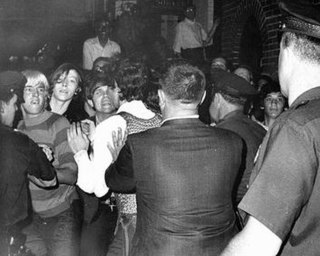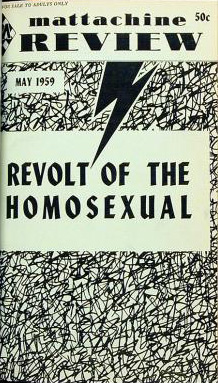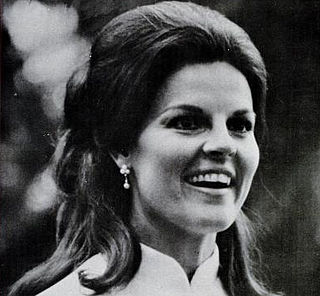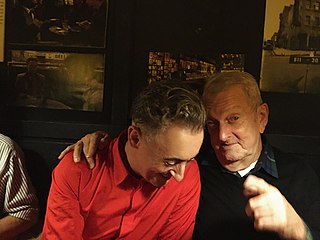
The Stonewall riots, also known as the Stonewall uprising, Stonewall rebellion, Stonewall revolution, or simply Stonewall, were a series of spontaneous, violent demonstrations against a police raid that took place in the early morning hours of June 28, 1969, at the Stonewall Inn, in the Greenwich Village neighborhood of New York City. Although the demonstrations were not the first time American homosexuals fought back against government-sponsored persecution of sexual minorities, the Stonewall riots marked a new beginning for the gay rights movement in the United States and around the world.

The Mattachine Society, founded in 1950, was an early national gay rights organization in the United States, preceded by several covert and open organizations, such as Chicago's Society for Human Rights. Communist and labor activist Harry Hay formed the group with a collection of male friends in Los Angeles to protect and improve the rights of gay men. Branches formed in other cities, and by 1961 the Society had splintered into regional groups.

The Stonewall Inn is a gay bar and recreational tavern at 53 Christopher Street in the Greenwich Village neighborhood of Manhattan in New York City. It was the site of the 1969 Stonewall riots, which led to the gay liberation movement and the modern fight for LGBT rights in the United States. When the riots occurred, Stonewall was one of the relatively few gay bars in New York City. The original gay bar occupied two structures at 51–53 Christopher Street, which were built as horse stables in the 1840s.

The gay liberation movement was a social and political movement of the late 1960s through the mid-1980s in the Western world, that urged lesbians and gay men to engage in radical direct action, and to counter societal shame with gay pride. In the feminist spirit of the personal being political, the most basic form of activism was an emphasis on coming out to family, friends, and colleagues, and living life as an openly lesbian or gay person.

Franklin Edward Kameny was an American gay rights activist. He has been referred to as "one of the most significant figures" in the American gay rights movement.

The NYC Pride March is an annual event celebrating the LGBTQ community in New York City. The largest pride parade and the largest pride event in the world, the NYC Pride March attracts tens of thousands of participants and millions of sidewalk spectators each June, and carries spiritual and historical significance for the worldwide LGBTQIA+ community and its advocates. Entertainer Madonna stated in 2024, "Aside from my birthday, New York Pride is the most important day of the year." The route through Lower Manhattan traverses south on Fifth Avenue, through Greenwich Village, passing the Stonewall National Monument, site of the June 1969 riots that launched the modern movement for LGBTQ+ rights.
This is a list of notable events in the history of LGBT rights that took place worldwide in the 1950s.
This is a list of notable events in the history of LGBT rights that took place in the 1960s.

Pride is the promotion of the self-affirmation, dignity, equality, and increased visibility of lesbian, gay, bisexual, transgender and queer (LGBTQ) people as a social group. Pride, as opposed to shame and social stigma, is the predominant outlook that bolsters most LGBTQ rights movements. Pride has lent its name to LGBTQ-themed organizations, institutes, foundations, book titles, periodicals, a cable TV channel, and the Pride Library.

Julius' is a tavern at 159 West 10th Street and Waverly Place in the Greenwich Village neighborhood of Manhattan in New York City. It is often called the oldest continuously operating gay bar in New York City. Its management, however, was actively unwilling to operate as such, and harassed gay customers until 1966. The April 1966 "Sip-In" at Julius, located a block northeast of the Stonewall Inn, established the right of gay people to be served in licensed premises in New York. This action helped clear the way for gay premises with state liquor licenses.
The Tavern Guild was an association of gay bar owners and liquor wholesalers that formed in 1962 in San Francisco, California, and lasted until 1995.

Craig L. Rodwell was an American gay rights activist known for founding the Oscar Wilde Memorial Bookshop on November 24, 1967 - the first bookstore devoted to gay and lesbian authors - and as the prime mover for the creation of the New York City gay pride demonstration. Rodwell, who was already an activist when he participated in the 1969 Stonewall uprising, is considered by some to be the leading gay rights activist in the early, pre-Stonewall, homophile movement of the 1960s.

New York state, a state in the northeastern United States, has one of the largest and the most prominent LGBTQ populations in the world. Brian Silverman, the author of Frommer's New York City from $90 a Day, wrote that New York City has "one of the world's largest, loudest, and most powerful" LGBT communities", and "Gay and lesbian culture is as much a part of New York's basic identity as yellow cabs, high-rises, and Broadway theatre". LGBT travel guide Queer in the World states, "The fabulosity of Gay New York is unrivaled on Earth, and queer culture seeps into every corner of its five boroughs". LGBT Americans in New York City constitute by significant margins the largest self-identifying lesbian, gay, bisexual, and transgender communities in the United States, and the 1969 Stonewall riots in Greenwich Village are widely considered to be the genesis of the modern gay rights movement.

New York City has been described as the gay capital of the world and the central node of the LGBTQ+ sociopolitical ecosystem, and is home to one of the world's largest and most prominent LGBTQ+ populations. Brian Silverman, the author of Frommer's New York City from $90 a Day, wrote the city has "one of the world's largest, loudest, and most powerful LGBT communities", and "Gay and lesbian culture is as much a part of New York's basic identity as yellow cabs, high-rise buildings, and Broadway theatre". LGBT travel guide Queer in the World states, "The fabulosity of Gay New York is unrivaled on Earth, and queer culture seeps into every corner of its five boroughs". LGBTQ advocate and entertainer Madonna stated metaphorically, "Anyways, not only is New York City the best place in the world because of the queer people here. Let me tell you something, if you can make it here, then you must be queer."

In 1977, the Texas State Bar Association invited country singer Anita Bryant to perform at a meeting in Houston, Texas. In response to Bryant's outspoken anti-gay views and her Save Our Children campaign, thousands of members of the Houston LGBT community and their supporters marched through the city to the venue in protest on June 16, 1977. The protests have been called "Houston's Stonewall" and set into motion the major push for LGBT rights in Houston.

Richard Joseph Leitsch, also known as Richard Valentine Leitsch and more commonly Dick Leitsch, was an American LGBT rights activist. He was president of gay rights group the Mattachine Society in the 1960s. He conceptualized and led the "Sip-In" at Julius' Bar, one of the earliest acts of gay civil disobedience in the United States, LGBT activists used "sip-ins" to attempt to gain the legal right to drink in bars in New York. He was also known for being the first gay reporter to publish an account of the Stonewall Riots and the first person to interview Bette Midler in print media.
Martin "Marty" Robinson was an American gay activist, "known for his provocative protests."
Equal is an American documentary television series produced by Scout Productions, Berlanti Productions, Raintree Ventures, That's Wonderful Productions, and Warner Horizon Unscripted Television. The four-part series chronicles landmark events and leaders in LGBTQ history, and consists of a mixture of archival footage and scripted reenactments. Equal stars several actors including Samira Wiley, Jamie Clayton, and Anthony Rapp. The series premiered on HBO Max on October 22, 2020.
The Mattachine Society of Washington (MSW) was a gay rights organisation founded in August 1961 by Frank Kameny and Jack Nichols. While the organisation was named after the original, California-based Mattachine Society established in 1950, it was distinguished from other Mattachine Societies by its militancy.










